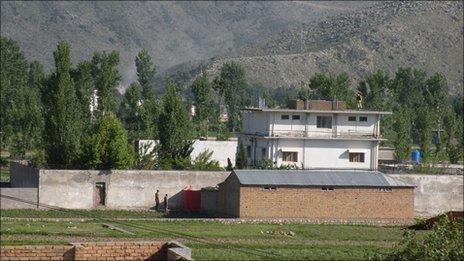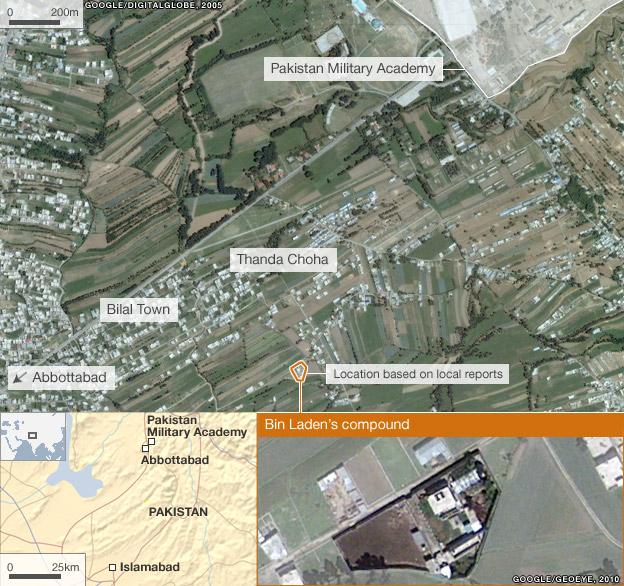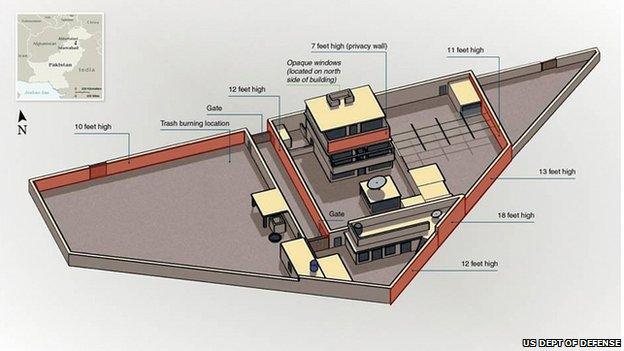Bin Laden neighbours describe Abbottabad compound
- Published

The compound is set back in a field and was securely guarded
A sleepy suburb of the peaceful hill resort of Abbottabad nestling in the Orash valley in north-west Pakistan was the unlikely setting for Osama Bin Laden's demise.
In the dead of night, residents of the middle-class area, home to retired army officers and businessmen, woke to a helicopter gunfight, which filled them with dread.
Residents told me they knew immediately that if any home in their midst was going to be the target of an attack, it would be the private, secure compound protected by barbed wire and whose furtive residents were rarely seen or heard.
One of Bin Laden's neighbours, who lived just 100 metres away from him, described how he took to his roof to witness the dramatic raid.
"The helicopter swept past my house, flying very low, coming very close. I threw myself to the ground thinking it was going to collide with my house," Zahoor Abbasi said.
There was a massive explosion: a huge flame leapt into the sky from the house, and then shortly afterwards it all appeared to be over.
Mr Abbasi said he had no idea the place was the residence of Osama Bin Laden. There were no rumours and no obvious clue that he was living in their midst.
Furtive neighbour
But Mr Abbasi said that ever since he moved into the area six years ago, he felt that house was a dangerous place and best avoided.
The security measures put in place at the compound were extraordinary: 14ft (4.5m) high walls surrounding the complex; a 7ft private security wall on the second floor; security gates and cameras.
Every now and then, bullet-proof vehicles would enter and leave the compound with little fanfare. Gates would open and then shut immediately afterwards - there was no neighbourliness.
Hashmi Colony, at the slightly more inexpensive end of the Bilal Town area, is a residential, suburban community where most homes have a car and a family.
Footage from inside Bin Laden's compound
It is still in the process of being built - many people have bought plots of land here as they seek to build up a life and a home.
Abbottabad has a reputation as a peaceful, quiet town with excellent literacy rates, good schools and a temperate climate.
It is an agricultural area and many houses are only about five or six years old - nobody was able to put an exact date on this compound but many thought it was about 10 or 12 years old.
When it was first built, it was likely to have been quite isolated in its agricultural setting. But as more people moved in, its privacy was slowly being eroded.
And the neighbours were watching. People living nearby say they rarely saw more than two or three people around the house.
There was no sign of domestic activity or children playing, no trips to the market, the kind of activity that characterises domestic existence in communities such as these.
There were other signs of intrigue too.
Over the past two months, people in simple, plain clothes came around posing as prospective property buyers who wanted to get to know the area a bit better.
They would admire neighbours' homes and request for their architectural plans, saying they wanted to build houses similar to those seen in the vicinity.
One of the men even went to the Bin Laden compound to make inquiries.
A neighbour told me that he now thinks these were men trying to uncover information.
'Pashtun' connection
But there is also another angle to the reserve and suspicion with which the compound was viewed.
When they heard gunshots and explosions ring out through the night sky, many neighbours initially thought the Taliban had launched an attack in the area.
The area is only about a kilometre from Pakistan's elite military training academy, and the Taliban frequently target such academies.
Also, many ethnic Pashtun families have moved into the area and built their houses there.
Some neighbours said that Pashtuns are known to keep their women in strict purdah and that would explain the silence from that house.
The Taliban are largely ethnically Pashtun and many come from the tribal areas in north-west Pakistan.
The idea that the Taliban were connected to that house had crossed the mind of one resident I spoke to. That is partly because it was assumed that the Taliban had come to be with their Pashtun kith and kin, who are seen as providers of sanctuary for the Taliban.
It highlights the latent concerns and assumptions in the Pakistani mindset about ethnicity and loyalty.

But the residents of this compound appear to have led such an isolated existence that it could not have had anything to do with the Pashtuns who have also made this quiet and prosperous suburb their home.
